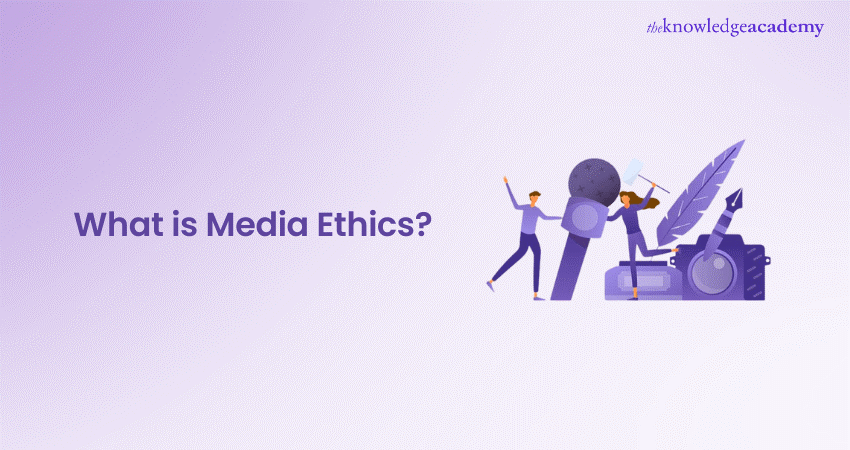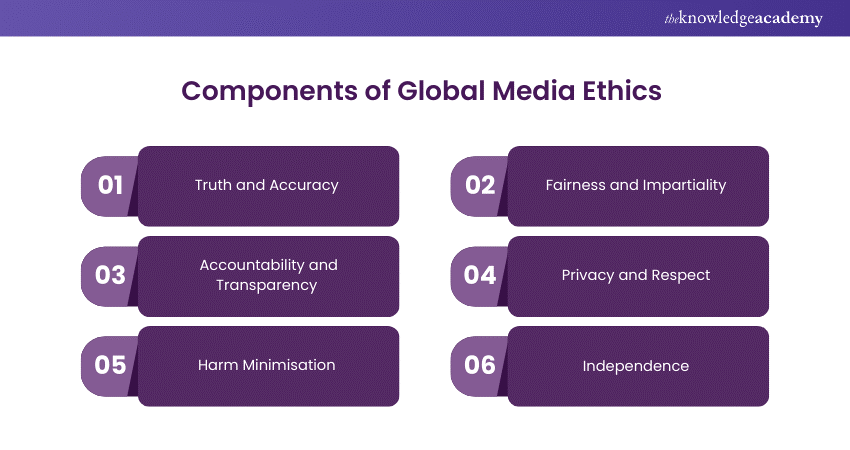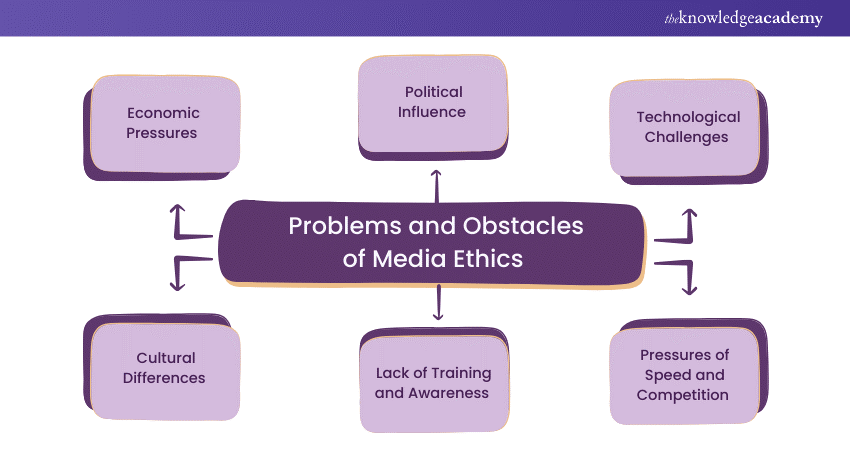We may not have the course you’re looking for. If you enquire or give us a call on +44 1344 203999 and speak to our training experts, we may still be able to help with your training requirements.
Training Outcomes Within Your Budget!
We ensure quality, budget-alignment, and timely delivery by our expert instructors.

In a world flooded with information, discerning fact from fiction is more crucial than ever. What is Media Ethics? It's the compass guiding journalists, broadcasters, and digital content creators through the complex landscape of truth and responsibility.
This blog talks about What is Media Ethics, its importance and the need for global ethical standards in media. From objectivity and fairness to privacy and accountability, we'll explore the ethical framework that underpins responsible journalism. Join us as we delve into the heart of Media Ethics.
Table of Contents
1) What is Media Ethics?
2) Importance of Media Ethics
3) Why Global Ethics?
4) Components of Global Media Ethics
5) Problems and Obstacles of Media Ethics
6) Conclusion
What is Media Ethics?
In media, a code of ethics guides how information is communicated and broadcast. Whether you're a writer, journalist, news broadcaster, or social media content creator, understanding Media Ethics in mass communication is crucial for becoming a competent communicator. Our complete guide to Media Ethics in mass communication explores the moral principles and values essential in the content of mass media.
Media Ethics shape how we perform our roles in the mass communication industry, emphasising the importance of ethical standards. In news coverage, Media Ethics addresses issues like impartiality, objectivity, balance, bias, privacy, and the public interest.
Importance of Media Ethics
Media Ethics are vital for several reasons. All contribute to the integrity and reliability of media as a pillar of democracy and society. Here are key reasons why Media Ethics are important:
a) Trust and Credibility: Ethical practices build trust with the audience. Media outlets adhering to ethical standards are seen as credible sources of information. This is essential for maintaining a loyal audience.
b) Informed Public: Media Ethics ensure that the information disseminated is accurate and fair. This enables the public to make informed decisions about various issues, from politics to health.
c) Protection of Individuals: Ethical standards protect individuals' rights. These include their privacy and dignity. This is important in cases involving sensitive information or vulnerable populations.
d) Preventing Harm: Ethical media practices help to minimise harm by avoiding sensationalism and graphic content. Hate speech can have detrimental effects on society.
e) Professional Integrity: Adhering to ethical standards fosters a sense of professional integrity among journalists. It promotes a culture of honesty. Accountability is maintained within the industry.
Why Global Ethics?
In today's interconnected world, media content transcends national borders. This makes the establishment of global ethical standards increasingly important. Here are some reasons why a global ethics framework for media is necessary.
a) Consistency Across Borders: A global ethics framework ensures consistency in media practices. This applies regardless of the country or culture. Such consistency helps maintain high standards of journalism worldwide.
b) Combating Misinformation: The rapid spread of information through digital platforms adds complexity. Global ethical standards can help combat misinformation and fake news. This ensures that accurate and reliable information reaches audiences everywhere.
c) Protection of Human Rights: A global approach to Media Ethics emphasises protecting human rights. It universally promotes respect for privacy, dignity and freedom of expression.
d) Promoting Cross-Cultural Understanding: Ethical media practices can foster greater understanding. They support tolerance among different cultures by ensuring fair and respectful representation of diverse perspectives.
e) Supporting Democratic Values: Media plays a crucial role. It supports democratic values by providing a platform for free expression. It also fosters informed public debate.
Kickstart your career in journalism—join our Get into Journalism Training and develop the skills effortlessly!
Components of Global Media Ethics
Global Media Ethics involves understanding and applying ethical standards in media practices worldwide. It includes several key components:

Truth and Accuracy
The cornerstone of Media Ethics is truth and accuracy. Media professionals must ensure the information they disseminate is accurate, verified, and truthful. This involves thorough fact-checking. They must cross-reference sources and avoid the spread of misinformation or false news.
Fairness and Impartiality
Media should strive to be fair and impartial. They should present all sides of a story without bias. This means giving voice to different perspectives. Avoid favouritism in reporting and ensure balanced reporting. Fairness also involves treating subjects with respect and avoiding sensationalism.
Accountability and Transparency
Media organisations and professionals must be accountable for their actions This includes owning up to mistakes and correcting errors promptly and being transparent about their processes and sources. Transparency helps build trust and ensures credibility.
Privacy and Respect
Respecting privacy of individuals is a crucial aspect of Media Ethics. Media professionals must balance the public's right to know. They must also respect individuals' rights to privacy. This involves careful consideration. They must be cautious when reporting on sensitive issues. Avoiding unnecessary intrusion into people's private lives is essential.
Harm Minimisation
Media should aim to minimise harm in their reporting. This means avoiding content that could cause undue distress, harm reputations unfairly, or incite violence or discrimination. Ethical media practice involves thoughtful consideration of the potential impact of their stories on individuals and communities.
Independence
Independence is vital for maintaining the integrity of media. Media professionals should be free from undue influence from external entities, including political, corporate, or personal interests. Independence ensures that reporting is based on facts and not influenced by external pressures.
Ensure ethical integrity in your media practices—Join our Media Ethics and Governance Training today!
Problems and Obstacles of Media Ethics
Despite the importance of Media Ethics, there are several problems and obstacles that can impede ethical media practices:

Economic Pressures
Media organisations often face economic pressures that can compromise ethical standards. The need for profitability can lead to sensationalism, biased reporting, and the prioritisation of entertainment over factual news. Advertising revenue, in particular, can create conflicts of interest and influence content.
Political Influence
In many regions, media outlets are subject to political influence and control. Governments may exert pressure on media to report favourably on certain issues or censor unfavourable content. This undermines the independence of the media and can lead to biased or misleading reporting.
Technological Challenges
The rise of digital media and social platforms presents new ethical challenges. The rapid spread of information online makes it difficult to verify facts and control misinformation. Additionally, the anonymity and reach of the internet can lead to ethical breaches, such as cyberbullying, invasion of privacy, and the spread of fake news.
Cultural Differences
Global Media Ethics must navigate diverse cultural norms and values. What is considered ethical in one culture may not be viewed the same way in another. Media professionals must be aware of these differences and strive to respect cultural sensitivities while maintaining ethical standards.
Lack of Training and Awareness
Not all media professionals receive adequate training in Media Ethics. This can lead to unintentional ethical breaches and a lack of understanding of the importance of ethical standards. Continuous education and awareness programs are essential to uphold Media Ethics.
Pressures of Speed and Competition
In the fast-paced world of news, the pressure to be the first to break a story can compromise accuracy and ethical considerations. Media professionals must balance the need for speed with the responsibility to verify information and report truthfully.
Conclusion
We hope that you read this blog thoroughly and it answered your question as to What is Media Ethics. Despite the challenges and obstacles, adhering to ethical standards ensures responsible journalism, protects individual rights, and promotes informed public discourse. Establishing global ethical standards is essential for consistency and reliability across borders, fostering trustworthy and effective media worldwide.
Transform your potential into success—Register for our Personal Development Training today!
Frequently Asked Questions

Journalists balance the right to privacy with the public's right to know by carefully evaluating the newsworthiness of the information and its potential impact on the public. They aim to disclose information that serves the public interest while minimising unnecessary intrusion into individuals' private lives.

The digital age and social media have significantly impacted Media Ethics by accelerating the spread of information, increasing the risk of misinformation, and challenging traditional standards of accuracy and accountability. The rapid dissemination of content online often pressures journalists to prioritise speed over fact-checking.

The Knowledge Academy takes global learning to new heights, offering over 30,000 online courses across 490+ locations in 220 countries. This expansive reach ensures accessibility and convenience for learners worldwide.
Alongside our diverse Online Course Catalogue, encompassing 17 major categories, we go the extra mile by providing a plethora of free educational Online Resources like News updates, Blogs, videos, webinars, and interview questions. Tailoring learning experiences further, professionals can maximise value with customisable Course Bundles of TKA.

The Knowledge Academy’s Knowledge Pass, a prepaid voucher, adds another layer of flexibility, allowing course bookings over a 12-month period. Join us on a journey where education knows no bounds.

The Knowledge Academy offers various Personal Development Courses, including the Earned Value™ Management Foundation and Practitioner Course, and the Earned Value™ Management Foundation Course. These courses cater to different skill levels, providing comprehensive insights into Media Ethics and Governance.
Our Business Skills Blogs cover a range of topics related to Earned Value Management, offering valuable resources, best practices, and industry insights. Whether you are a beginner or looking to advance your Personal Development skills, The Knowledge Academy's diverse courses and informative blogs have got you covered.
Upcoming Business Skills Resources Batches & Dates
Date
 Media Ethics and Governance Training
Media Ethics and Governance Training
Fri 20th Dec 2024
Fri 14th Feb 2025
Fri 11th Apr 2025
Fri 13th Jun 2025
Fri 15th Aug 2025
Fri 10th Oct 2025
Fri 12th Dec 2025







 Top Rated Course
Top Rated Course



 If you wish to make any changes to your course, please
If you wish to make any changes to your course, please


